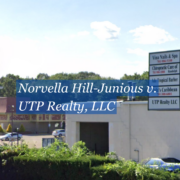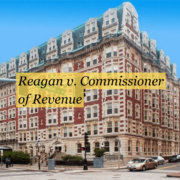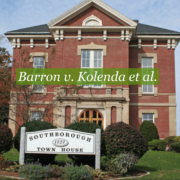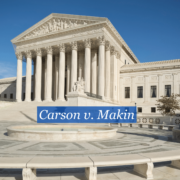Legal Advocates Ask Supreme Court to End Home Equity Seizures in Tax Foreclosures
October 15, 2025
After Major Court Victory in Massachusetts, Legal Advocates Bring Home Equity Theft Battle to the Supreme Court
BOSTON, MA — The Pioneer New England Legal Foundation (Legal Foundation), Greater Boston Legal Services (GBLS), and law firm Greenberg Traurig filed an amicus brief with the U.S. Supreme Court in support of homeowners in two Michigan cases that could determine how far governments can go in taking property for unpaid taxes.
The brief asks the Court to review two cases, McGee v. Alger County and Joseph v. Iron County, which challenge local policies that impede people from recovering the remaining value of their homes after a tax foreclosure — even when their tax debt and all related expenses have been paid in full. The process is often referred to as “equity theft.” The Court is expected to decide whether to hear the cases in the coming months.
The brief follows Pioneer New England Legal Foundation’s involvement in Tyler v. Hennepin County (2023), the landmark Supreme Court ruling that made clear: government entities cannot keep more than what is owed when taking property for unpaid taxes. Writing for a unanimous Court, Chief Justice John Roberts summarized the ruling as establishing that “[t]he taxpayer must render unto Caesar what is Caesar’s, but no more.“
“These two new cases show that, even after Tyler, some local governments are imposing complex and unreasonable hurdles that strip people of their home equity for minor missteps,” said Frank J. Bailey, President of Pioneer New England Legal Foundation. “In one case, a homeowner’s claim was rejected simply because she used FedEx instead of certified mail — even though it was delivered on time. She lost the family’s wealth simply by using the wrong method of mail. That’s not justice.”
“Often, it is the most vulnerable homeowners who are victims of equity theft. Equity theft impacts elders in distress and others who, for a variety of reasons, have difficulty keeping up with mail, understanding complex notices, and complying with short deadlines. The Supreme Court has the opportunity to protect homeowners and the home equity that they have worked so hard to build,” said Todd Kaplan, a Senior Attorney at Greater Boston Legal Services.
The brief urges the Court to consider the cases and overturn Nelson v. City of New York, an outdated decision that allows municipalities to keep all proceeds after foreclosure, regardless of how small the debt was, if the homeowner fails to fulfill procedural requirements set by the government. Advocates argue this practice violates the U.S. Constitution, which requires governments to pay just compensation when taking private property.
The recent brief follows on the heels of a win in the Massachusetts courts for the Foundation and GBLS on home equity theft. In 2024, in the case of Mills v. City of Springfield, the Massachusetts Superior Court struck down the state’s tax lien statute finding that taking more than what is owed in taxes and fees is unconstitutional. In that case, the City of Springfield attempted to take Ashley Mills’s home, worth $230,000, when she could not pay $1,636.70 in real estate taxes. Following that decision, the Massachusetts state legislature created a new, fairer foreclosure process in the Commonwealth.
To read the amicus, visit: Pioneerlegal.org
A ruling on whether the Court will take up this important issue is expected before the end of the year. For additional information, visit: Home – Supreme Court of the United States
To read about the Massachusetts’ cases: Fighting to End Unconstitutional Equity Theft – Pioneer New England Legal Foundation






